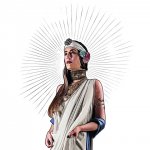I have been wondering, was the Trojan War real? I decided to explore the topic. I still don't know. What do you guys think?
Let's start with the basics. According to ancient Greek mythology, the Trojan War was fought between the Greeks and the Trojans over Helen of Troy. Helen, the wife of King Menelaus, was said to be the most beautiful woman in the world. When she was kidnapped by Paris of Troy, her husband called upon the Greek army to help him get her back. The war lasted ten years, according to the myth, and ended with the Greeks claiming victory when they used a wooden horse to get inside the walls of Troy.
It's easy to dismiss this story as nothing more than a legend, but there is some archaeological evidence that suggests that there may be some truth to the tale. In the 1870s, a German businessman named Heinrich Schliemann claimed to have found the site of ancient Troy in modern-day Turkey. He found evidence of a walled city with multiple layers of ruins, which might have been the result of multiple attacks over time. Whether or not this was the site of the Trojan War is still up for debate, but it's clear that Schliemann believed that he had discovered the home of king Priam and the legendary Trojan horse.
That said, not everyone agrees with Schliemann's findings. In fact, some scholars argue that the city he found wasn't actually Troy at all, but another nearby city with a similar name. Others point out that the ruins he found don't quite match up with the descriptions of the city in the Iliad. Additionally, there is evidence that suggests that the Trojan War didn't happen exactly as it was told in the myth. For example, it's possible that the conflict arose over economic disputes rather than the kidnapping of Helen.
Despite the disagreements among scholars, one thing is for sure: The Trojan War has had a lasting impact on culture and has become one of the most well-known stories from Greek mythology. It has been retold in countless books, movies, and TV shows over the years, and the characters from the story continue to inspire us today. The Trojan hero Hector, for example, has become synonymous with bravery, while Odysseus's journey home has been the inspiration for many other epic tales.





